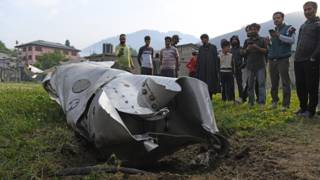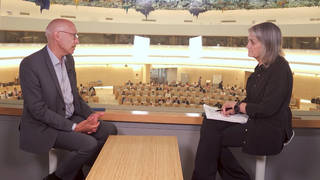
Guests
- Arundhati Royaward-winning Indian writer and renowned global justice activist. Her latest book is Field Notes on Democracy: Listening to Grasshoppers.
The award-winning Indian author Arundhati Roy is facing possible arrest in India on sedition charges after publicly advocating for Kashmir independence and challenging India’s claim that Kashmir is an “integral part of India.” If charged and convicted of sedition, Roy could face up to life in prison.
The interview was conducted Sept. 19, 2010 in London. [includes rush transcript]
Transcript
AMY GOODMAN: We turn to the award-winning Indian author Arundhati Roy, facing possible arrest in Indian on sedition charges after recent comments she made about Kashmir.
Earlier today, an Indian politician from the right-wing BJP party filed a written complaint against Roy after she publicly advocated for Kashmir independence and challenged India’s claim that Kashmir is a, quote, “integral part of India.” The area of Kashmir has been at the center of a decades-long dispute between India and Pakistan. Arundhati Roy made the comment at a conference organized to call on India to formally admit that Kashmir is an internationally recognized dispute. If charged and convicted of sedition, Arundhati Roy could face up to life in prison.
On Tuesday, she defended her statements made at the conference. She wrote, quote, “I said what millions of people here say every day…I spoke about justice for the people of Kashmir who live under one of the most brutal military occupations in the world.”
Roy went on to write, quote, “Pity the nation that has to silence its writers for speaking their minds. Pity the nation that needs to jail those who ask for justice, while communal killers, mass murderers, corporate scamsters, looters, rapists, and those who prey on the poorest of the poor, roam free.”
Well, last month, I had a chance to interview the author of The God of Small Things, Arundhati Roy, about Kashmir. We spoke in London. She began by describing how Kashmir is the unfinished business of the partition of India in 1947.
ARUNDHATI ROY: Since the 1990s, which is when — you know, at the same time that the war in Afghanistan, the American one, its jihad in Afghanistan, and India realigned itself and became, you know, what it is now, sort of completely aligned with the US. And, you know, the whole problem in Kashmir, the militant armed struggle for independence — I mean, there was always a struggle for independence. It’s not independence. It’s not ever been really a part of India, which is why it’s ridiculous for the Indian government to keep saying it’s an integral part of India. But that armed struggle claimed the lives of 68,000 people, because India today has 500,000 troops manning that little valley. It’s the highest, most militarized zone in the world.
India has done everything wrong there. Apart from a military occupation, it has completely rigged elections. It has changed that valley into a little sort of puddle, a little pool of spies and informers and intelligence networks and torture chambers. And today, you know, it’s come to a stage where people have just had enough. Now you don’t even know who the rulers are — I mean, who the leaders of the uprising are, because it’s just people who cannot take it anymore. But the government still is quite busy trying to manage the crisis. You know, there’s are all sorts of shady things going on. Cleaning mobs are setting business — buildings on fire, when it does look very much as though the intelligence agencies are doing that themselves in order to, you know, paint — once again paint this uprising in a different light.
But the fact is that it’s a bit like feeding a population heavy metal in its diet all the time. And that metal, that toxicity, it just lives in the body, you know, and it goes into different places at different times, but the body never gets rid of it. And now that toxicity has reached a stage where I really think that until the international community somehow pays attention, this small valley is going to be just squashed by this completely, I mean, intransigent juggernaut that is the Indian state, that will not back off, doing something absolutely — absolutely immoral, you know? Absolutely as bad as it is in any other kind of occupation, including the Israeli occupation of Palestine, you know? But Kashmir, nobody talks about.
AMY GOODMAN: You’ve been there.
ARUNDHATI ROY: Of course I’ve been there. I spend a lot of time there.
AMY GOODMAN: And so, how does it fuel what is happening in Pakistan, and maybe even going into Afghanistan?
ARUNDHATI ROY: Well, I mean, obviously, Pakistan and India, Kashmir is the toxic center of that relationship. And unless it’s resolved, I don’t think any part of Afghanistan, Pakistan and India can be — that whole area is like getting more and more toxic, you know? And what —- right now the fact is that the US is deeply involved in all of it. And as far as -—
AMY GOODMAN: How?
ARUNDHATI ROY: Because of what it’s been doing in Pakistan and Afghanistan all these years. But right now in India, I mean, the Congress government can’t resolve Kashmir on its own, because the right-wing BJP is there to stymie it at any point of time, you know? So it does need now an intervention from a larger community that is saying to this country that this is just not acceptable.
AMY GOODMAN: What do you think needs to happen?
ARUNDHATI ROY: I think there has to be a kind of undiplomatic, if you like, intervention. A lot of people from outside need to look at that issue very carefully and stop looking at India as if, “Oh, it’s just this market where we can — you know, it’s a good financial destination, so let it do what it wants in Kashmir,” because that’s — the whole thing is going to unravel. So I do think that even the Americans need to look into Kashmir and, you know, talk about it, since they are involved in creating this cesspool there now.
AMY GOODMAN: The conflict is what? Who is fighting for what?
ARUNDHATI ROY: The Kashmiris. See, Jammu and Kashmir used to been an independent kingdom at the time of partition. And when partition happened, all these independent princely states were told that they could, you know, decide whether they wanted to go with India or with Pakistan, which is already a bit strange. You know, why should — I mean, what was the moral logic behind that? But anyway, in Kashmir, there had already been a democratic movement against the king, who was actually a Hindu king ruling Muslim — a majority Muslim state. So the king really didn’t have any moral authority at the time. And when partition happened, because of how it happened, he signed a letter of ascension, you know, asking India to send in troops. But that was based on the fact that there would be a plebiscite later. And that plebiscite never took place, you know, and the situation just became worse and worse and worse. So, right now what they are fighting for is what they call “Azadi,” which is independence from India and from Pakistan.
AMY GOODMAN: And why the escalation of violence now and the escalation of protest now?
ARUNDHATI ROY: Well, it’s the third year in succession, you know? In 2008, first — there’s always some pretext, you know, but the pretexts are not important. In Kashmir even, if the electricity goes off, it turns into a struggle for independence. You know, so, in a way, it’s sort of looking away from the issue to find the immediate cause.
But the immediate cause this time — last summer it was two girls who were drowned, who were — you know, who were sort of killed and drowned, and then they said — I mean, whose bodies were found in this shallow water. And they said, oh, you know, they drowned in this three inches of water or whatever it was. Year before that, it was over the sort of transfer of land to this Amarnath Yatra, which is a sort of Hindu pilgrimage trust. And this year, it’s because protests happened and the police started to shoot into the crowd and kill young boys, and it just became bigger and bigger and bigger ’til now, already sixty or seventy young people have been killed.
But the point is that it’s never been so huge, the protests. They’ve gone on — it’s gone on for months. They’re not being able to diffuse it. They don’t know who to arrest. They don’t know who to kill. You know, they’re longing for it to become the same old, same old — you know, some militants that they can say are sent from Pakistan — but they can’t deal with these basically unarmed crowds, stone-throwing stone pelters. They don’t know how to deal with them. So, every day, every day, the anger increases, and a few more are killed, and the anger increases.
AMY GOODMAN: Well, clearly the US has tremendous power, because it has billions invested in India. The latest is nuclear power deals, US corporations there. And, of course, the US pours billions into Pakistan. So, what do you think the US can do — and not just the government, but people calling for justice? What do you feel is just?
ARUNDHATI ROY: I think, for example, Obama is going to India now, and India is desperately trying to sort of, you know, push — like for the Commonwealth Games that are happening now, they are pushing all the beggars into some park and, you know, putting billboards around them so that no one will see them. And they are trying to do something similar in Kashmir, desperately trying to shut the problem away from public scrutiny before he comes.
But I think that the most important thing is now not to allow India or Pakistan to speak for Kashmiri people, you know? Because Kashmiri people need a space in which to think. They’ve just lived all their lives with a palatine bag over their heads and a gun pointed at their temples. They need — somebody needs to create the space for them to be able to say what they want, because this is a whole population that is in — living in the most insufferable conditions.
AMY GOODMAN: Arundhati Roy, speaking about Kashmir. We were sitting in London a few weeks ago, where she had come to visit. She is back in India now, and she faces possible arrest for sedition, for talking about Kashmir in the way she has described on Democracy Now!, calling for India to formally admit that Kashmir is an internationally recognized dispute.












Media Options